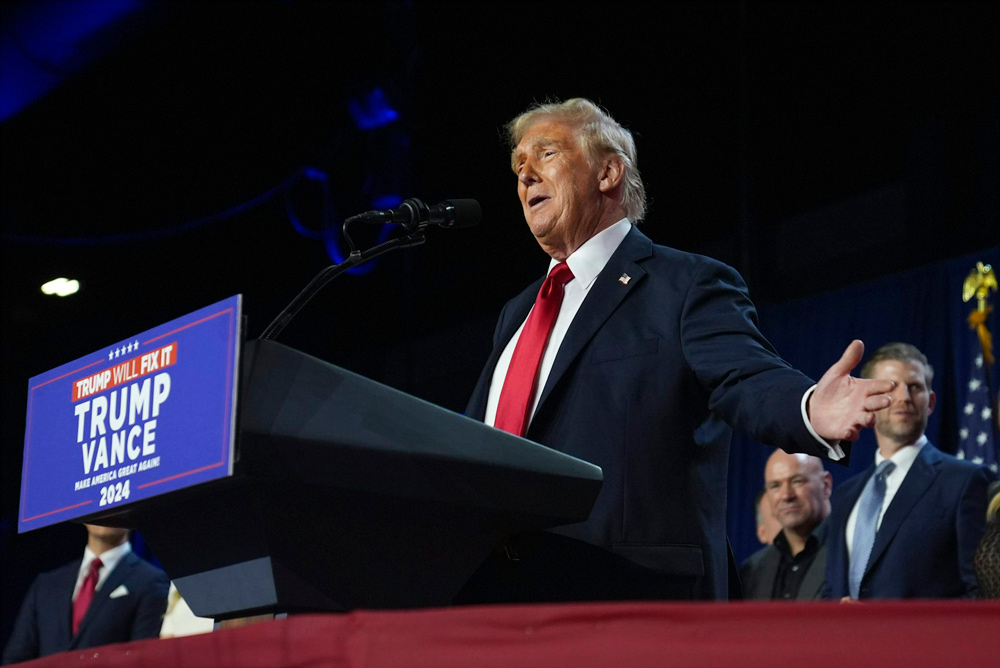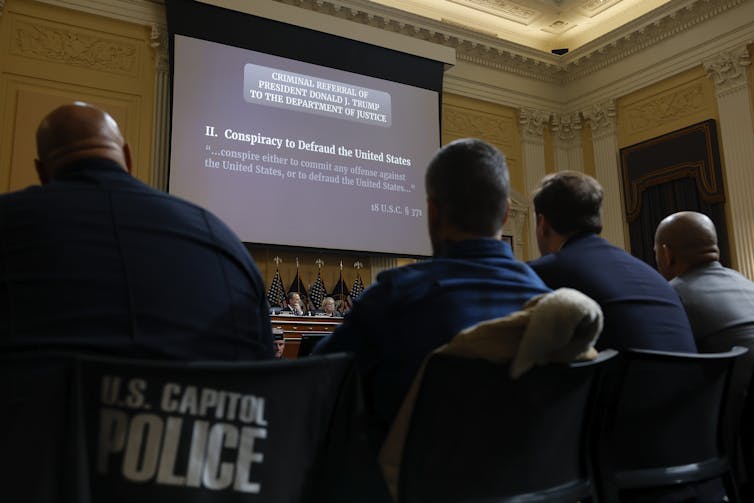
By Spencer Goidel
As the nation prepares for a second Donald Trump presidency, some history-minded people may seek understanding in the idea that it wasn’t until Richard Nixon’s second presidential term that the serious consequences arrived.
But as a scholar of American politics, I don’t think that’s the right parallel.
Trump has already faced most of the situations that brought down Nixon – a congressional investigation and federal prosecutors’ inquiries.
Trump has survived by – consciously or not – following the example of another American president who created a political party in his own image and used it to rule almost unchecked: Andrew Jackson, whose portrait Trump hung in the Oval Office during his first term.
Unlike Nixon, Trump outlasted investigations
Richard Nixon was reelected by an Electoral College landslide in 1972 in the midst of the Watergate scandal, in which people affiliated with Nixon’s reelection campaign broke into the headquarters of the Democratic National Committee and then sought to cover up their actions. Although Nixon started off his second term with sky-high approval, his demise soon followed.
A Senate special committee investigating the Watergate break-in was established just 18 days after his inauguration in January 1973. By the summer of 1974, evidence of Nixon’s involvement in the Watergate crimes had become overwhelming. In an Aug. 7, 1974, visit to the White House, Republican congressional leaders asked the president to step down. He announced his decision to resign the following day, Aug. 8, 1974.
Trump, however, has already weathered numerous legal battles, investigations and controversies. From the Jan. 6 committee to special prosecutor Jack Smith’s probes and the Mar-a-Lago documents case, Trump’s political career has been marked by repeated confrontations with legal and political institutions – including two impeachments by the House, though both were rejected by the Senate.

Anna Moneymaker/Getty Images
After the Republican Party’s loss in 2020 and an underwhelming performance in the 2022 midterms, many within the GOP urged Trump to step aside to allow for a new generation of leaders. But Trump held firm.
Investigations stalled or were delayed, giving him breathing room through to the 2024 election. Now, with his his return to the White House, Trump will almost certainly end the federal investigations, and there’s little sign that state cases will press forward soon.
In recent years, historical revisionism – popularized by Tucker Carlson – has taken place within segments of the Republican Party. Under this view, Nixon wasn’t ousted for his involvement in Watergate but rather was the victim of a system aligned against him. But where Nixon stepped aside, Trump has fought back.
Like Jackson, Trump reshaped his party
In many ways, though, Trump more closely resembles Jackson than the scandal-plagued Nixon.
Following his narrow defeat in the controversial 1824 election, Jackson, much like Trump would two centuries later, claimed the election had been stolen.
Jackson seized on his supporters’ frustrations, reorganizing the Democratic-Republican Party, which ultimately rebranded itself as the Democratic Party, in his own image. His followers championed his cause, creating state and local Democratic parties and building a powerful grassroots movement.
As a result, the Democratic Party democratized its nomination process, moving from elite-driven congressional caucuses that chose candidates behind closed doors to well-attended party conventions. This shift allowed voters to participate directly in the candidate selection process.
The new Jacksonian Democratic Party not only aligned with his views but also introduced a wave of increased political participation. Through what became known as the “spoils system,” Jackson rewarded loyalists by appointing them to government positions, ensuring that his allies held key roles in federal and state institutions. This approach allowed Jackson to implement his agenda more effectively, while also mobilizing his supporters at all levels of government, integrating them into the workings of American politics in unprecedented numbers.
When he won election in 1828, Jackson’s efforts created a political landscape that gave him broad power, including actions that bypassed institutional checks.
For instance, Jackson’s forced removal and relocation of Native American communities from their ancestral lands – the “Trail of Tears” – illustrated the dangers inherent when a president holds extensive unilateral power.
Jackson disregarded judicial decisions and public outcry, acting with executive authority that appeared unconstrained. An 1832 Supreme Court ruling – Worcester v. Georgia – established tribal sovereignty, yet Jackson refused to enforce the ruling and the displacement of the Cherokee people continued.
His restructured party and control over appointments allowed him to act with what seemed near-total impunity. Jackson demonstrated his power by vetoing the renewal of the charter for the Second Bank of the United States, then unilaterally directing the removal of federal deposits despite congressional support for the bank.
Likewise, Trump has reshaped the Republican Party. His influence has been evident in Republican primary contests, where candidates aligned with Trump’s vision succeeded, and opponents – the so-called “Never Trumpers” and “RINOs” – found themselves pushed to the margins.
This transformation has not been confined to rhetoric but is visible in the composition of state legislatures and in Congress, solidifying a pro-Trump ideology that extends to party policies and priorities. This shift gives Trump a firm foundation from which he can pursue his agenda.
Furthermore, the conservative majority on the Supreme Court has, in effect, become a guardian of the political revolution Trump has spearheaded, granting the executive substantial powers and legal protection.
What to look for next
But there are limits to what Trump can achieve, even with his strengthened position.
Unlike in Jackson’s era, today’s federal bureaucracy is a vast, entrenched institution, with checks in place that may challenge or obstruct executive overreach. Some of Trump’s promises – particularly around immigration policy, social welfare reform and trade – are likely to encounter resistance, not only from Democratic opposition but also from civil servants and legal processes embedded within federal agencies.
However, Trump has said he wants to substantially remake that federal bureaucracy, replacing experienced career public servants with political appointees aligned with Trump himself.
Donald Trump’s return to office likely signals an end to at least some of the yearslong investigations into his past actions and ensures his hold over the Republican Party remains intact. With a loyal base of voters and supportive institutions, Trump is positioned to further reshape the American political system.
![]()
Spencer Goidel is Assistant Professor of Political Science at Auburn University.





























James says
Nope, if history if not repeats, but rhymes. It’s more like Herbert Hoover.
Just an opinion.
joe says
Sure looks like it, James – it may have already started:
https://www.msn.com/en-us/money/markets/retailers-are-already-preparing-for-trump-s-tariffs-that-threaten-to-upend-the-economy/ar-AA1tIsuf?ocid=winp2fptaskbarhoverent&cvid=189f70820a9546b0bfe9f1c1a0afe2bc&ei=6
James says
Without the better qualities of Herbert Hoover I might add.
Pogo says
@Wrong country Spencer (as a reenactor, you ought to do better)
He already succeeded Buchanan, now he’s the direct successor to Jefferson Davis.
John says
Good bye USA.
jackson says
The strategy I foresee is that Trump will start with firing all Federal leadership in the executive branch that his staffers think are suspect. Federal law on the Civil Service will not matter since Trump won’t pay attention to Court orders and Congress will not impeach him for refusing to follow Court orders. He will also use control of the Senate to replace all the Generals he suspects of not being loyal to him with men like General Flynn. The firm control he will then have of all the levers of power will enable him to initiate ethnic cleansing of immigrants.
The Congress will be GOP controlled and will fund the concentration camps needed and there will be no shortage of volunteers to be camp guards. The new Federal paramilitary police force needed will give Trump full control of the US. Once he has that apparatus in place, only then will he start the purge and begin mass arrests of all his enemies including the Democratic leadership.
Tracey says
You don’t sound like you’re ok
dave says
All I know, voters turned out in record numbers. Florida saw the third-highest voter turnout in the last 70 years on Nov. 5, when nearly 11 million residents cast their ballots. The data shows that 78.76 percent of eligible voters showed up to the polls this year. In Flagler Cty, 83.4%, best since 1996.